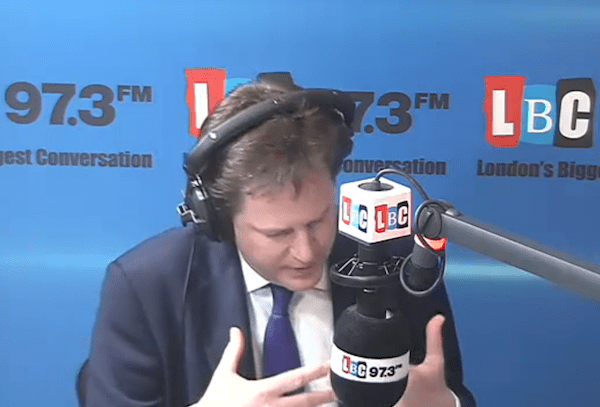Even though Nick Clegg made a big song and dance this morning on LBC about blocking the Snooper’s Charter, there is still a bit of confusion in Westminster about whether he has actually driven the fatal stake through its heart. The Prime Minister’s official spokesman said this morning that discussions are still ‘ongoing’, while some of those fighting the legislation on the Tory benches were a little worried that what the Deputy Prime Minister actually said was that he was killing bits of the Bill that upset people the most, not the whole thing.
This is what he told Nick Ferrari this morning:
‘Well look, what people have dubbed the “snooper’s charter”, I just have to be clear with you, that’s not going to happen. In other words idea the government would pass a law which means there will be a record kept of every website you visit, of any – who you communicate with on social media sites… that’s not going to happen, and it’s certainly not going to happen with Liberal Democrats in government. We all committed ourselves at the beginning of this Coalition government to learn the lessons from the past, when Labour overdid it, tried to constantly kind of keep tabs on everybody. We have a commitment in the Coalition Agreement to end the storage of email and internet information unless there’s a very good reason to do so.
‘Of course we need to support – and I’ve spoken to senior police officers and people from the security services – of course we need to support them they’ve got very significant powers already which I support them in deploying, to go after criminals to keep us safe. There are technical issues about how as technology changes, you’ve got to update that, so for instance we’ve all got more and more mobile devices, but there aren’t enough IP addresses to go around, and we need to straighten that out and that’s clearly something the government will do and will work with the police and others to do so, but this idea of a Snooper’s Charter, as it’s been dubbed, where a law is passed, where there’s a record kept of all the websites you visit, of who you communicate with on social media sites, I’m afraid that I think that wasn’t necessarily workable, nor proportionate, so it’s not going to happen.’
This means there will be no communications legislation in the Queen’s Speech. Clegg said there was still a need to work on IP address data, which is the most acceptable measure for the internet service providers. This was the most likely thing to survive any severe pruning of the bill, as Coffee House readers already know. I understand that this may not even need legislation, so chances are that we won’t see even a Communications Data Bill Lite appearing in the next few years. This is what the Prime Minister’s official spokesman was referring to when he said this morning that discussions are continuing, as well as the convention that Downing Street does not provide a running commentary on the content of the Queen’s Speech.
This is useful for Clegg, who had upset his party rather over the Justice and Security Bill. But it’s enormously awkward for Theresa May, who as well as having invested a great deal of personal capital in the legislation, had used some very strong language to try to sell it to MPs. Critics had pointed out the existing rules were not being enforced properly anyway and that the Home Office should have focused on using the huge amounts of data already available. We may well hear some strong language about the effect this will have on the police and security services’ ability to catch paedophiles and terrorists, but it looks like the security services will have to pounce on whoever takes charge in 2015 to get their Snooper’s Charter.
P.S. I predicted two days ago that it was most likely that Clegg would veto the legislation before the Queen’s Speech, but as I explained, the legislation would have limped through Parliament anyway, given growing opposition on the Tory benches.







Comments